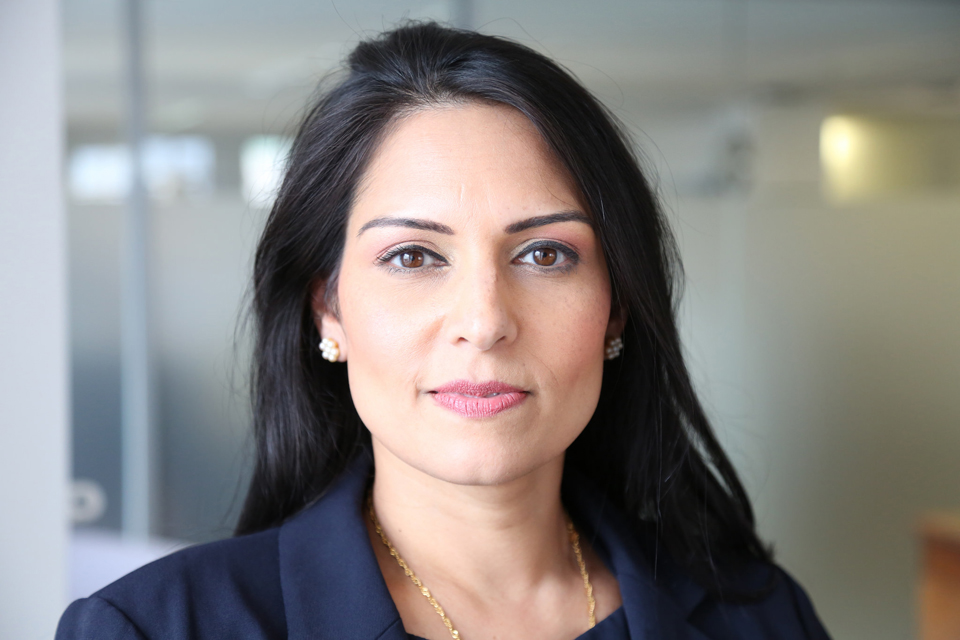Grand Challenges Conference 2016
Speech delivered by the Secretary of State for International Development Priti Patel at the Grand Challenges Conference, hosted by the Bill and Melinda Gates Foundation (BMGF), in London.

Introduction
Thank you Natasha for the warm welcome.
Good afternoon ladies and gentlemen.
It’s a real pleasure to be here with you all today.
I want to just start by thanking the Bill and Melinda Gates Foundation for inviting me here today - it’s great to be here and to join you on the platform today. You’ve only just outlined some of the things that we’ve been working on together and, believe me, there’s a lot more we can certainly do.
But, importantly, thank you for bringing Grand Challenges to London – the first time you’ve held it in Europe.
Of course Britain has a proud history of changing the world through ingenuity and invention.
From Edward Jenner, the pioneer of the smallpox vaccine, to John Snow whose map of cholera outbreaks in London changed how the world responded to disease, and to Sir Ronald Ross who identified the mosquito as the carrier of malaria.
UK development and research
Today, the UK is one the world’s research super-powers. And as Bill has just been saying, we are respected everywhere for both the quality and impact of that research.
My own department, the Department for International Development, is supporting UK scientists up and down the country to carry out that life-changing and also that life-saving research.
For example, we are supporting researchers at the University of Cambridge who are working with the UK Met Office and international wheat scientists, to track and prevent deadly outbreaks of wheat rust, a disease which can have a devastating impact on food supply in some of the world’s poorest places.
And 2 years ago, rapidly commissioned scientific research shaped the UK’s response to the deadly Ebola outbreak in West Africa. And I think the rest there is history in terms of how we all stepped up and intervened to really change the situation there.
But also the mathematical modelling techniques that helped us to identify new outbreak hotspots.
Also our work with the University of Oxford, pharmaceutical companies, and others, to develop and trial new Ebola vaccines and faster tests to diagnose the disease too.
The Challenge
And as Bill has just been saying, the world needs Britain’s leadership and spirit of innovation now more than ever. They say necessity is the mother of invention and look at the world today - we can see the need is incredibly great.
How do we feed the world’s hungry population?
How do we educate the millions of children living in warzones and refugee camps?
How do we provide jobs and a better future for Africa’s young and growing populations?
How do we prevent the next Zika or Ebola becoming a global pandemic?
Announcement of research funding
When faced with seemingly intractable problems like these, the world looks to the people here in this room, in this audience – the innovators, the scientists, the entrepreneurs, the trailblazers, the people with real vision.
You are the ones who manage to turn these enormous challenges, not just into opportunities – but into life-saving outcomes.
And I’m determined to support you by continuing to put top quality research and cutting edge technology at the heart of UK development.
That is why I’m today confirming that my Department for International Development will continue to invest 3% of our budget in high quality, high impact research.
And we will invest an additional £357 million to fund research on infectious diseases through the Ross Fund.
That means my Department will spend £390 million annually in research over the next 4 years.
This is in addition to the UK government’s other research funding for development – including our £1.5 billion Global Challenges Research Fund.
I am also publishing a research review today – which my Department developed in conjunction with the UK’s scientific community.
This review sets out how DFID will target future research funding at projects and partnerships that will help to address the global challenges of the 21st Century.
For example, given the number and scale of humanitarian emergencies we’re facing today – we will double our funding on research and innovation to improve our humanitarian responses, whether that ranges from 3-D printing of medical supplies to drones that map disaster zones.
We will also treble our research on education, on areas like how we use the latest digital technology to create virtual classrooms for the millions of children with no safe route to school.
We’re also developing evidence on critical but neglected issues - such as tackling human trafficking and child exploitation.
And I think, ladies and gentlemen, when we think about the scale of the humanitarian challenges we face today across the world, these are actually the really big issues where we need innovation, technology and research to step up.
Conclusion
In conclusion, our world-leading commitment to science and research will make UK development even faster and better value. And I’m also clear that this investment is firmly in our national interests.
Because when we invest in research to beat diseases like Ebola or to protect the world’s food supply - we are making the world a better place and bringing security to parts of the world that are constantly under pressure, constantly stressed and constantly challenged.
And that’s why a globally engaged and outward-looking Britain will continue to invest in science and technology today – to build a more secure and prosperous world for future generations to come.
Thank you very much.